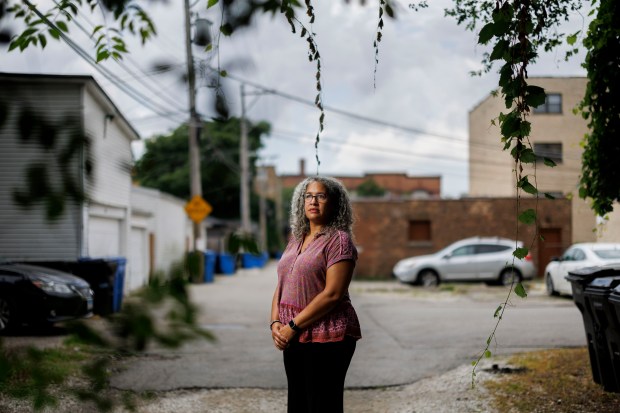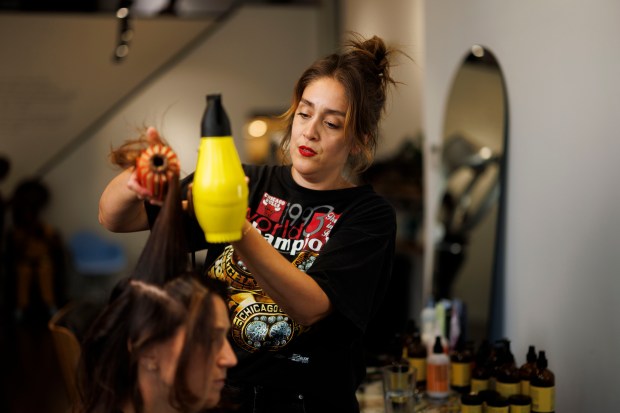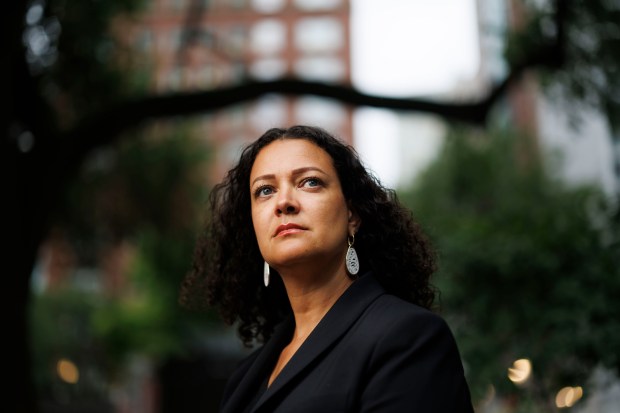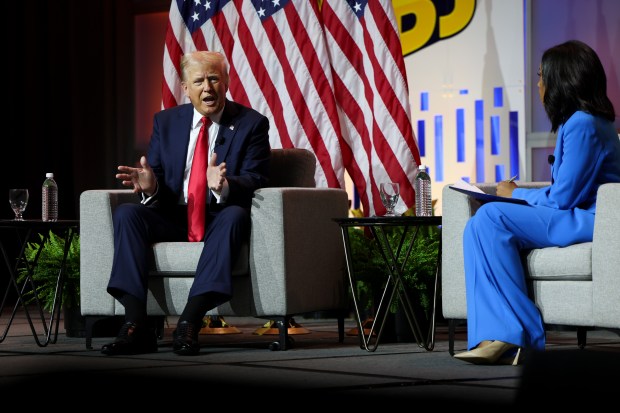Jennifer Leigh Husbands remembers the first time she was confronted with questions about whether she was Black or white. She was a student at the University of Virginia, and Husbands, whose mother was from Michigan and father from Barbados, listened to Grateful Dead music and drank beer at the time. People told her she was “playing for white.”
“This notion of having to prove your identity throughout your life is something that doesn’t go away in a country that is obsessed with race and deeply seeped in anti-Black racism,” the Lincoln Square resident said.
Husbands, 51, said she couldn’t bring herself to watch former President Donald Trump speak in Chicago on Wednesday. She had to read about it in the news.
“When people like Trump say things like what he said (Wednesday), I feel like it kind of sets the conversation back 20 years,” she said.
During an appearance before the National Association of Black Journalists, Trump said he hadn’t known that Vice President Kamala Harris — the Democrats’ presumptive nominee after President Joe Biden opted not to seek reelection and endorsed her as his successor — is Black.
“So I’ve known her a long time indirectly, directly not very much, and she was always of Indian heritage,” Trump said. “And she was only promoting Indian heritage. I didn’t know she was Black until a number of years ago when she happened to turn Black. And now she wants to be known as Black. So I don’t know — is she Indian or is she Black?”
Harris, who was born in Oakland, California, is the daughter of immigrants. Her mother is from India and her father was born in Jamaica. She is the first Black and Asian American woman to become a major party candidate for the presidency.
The challenges of being multiracial in the United States were highlighted in the face of Trump’s messaging, experts said. Harris shouldn’t have to justify how her ancestry and biology align with her racial identity: her customs, languages and traditions, they said.
“Trump is attempting to diminish her credibility by suggesting that she has only recently identified as Black,” said Emily Williams, executive director of the Arcus Center for Social Justice Leadership at Kalamazoo College in Michigan. “He does not have the authority to assert what anyone’s racial identity should be.”
His statement thrust Harris’ racial identity into the national spotlight, touching on an issue that struck a chord with one of the fastest-growing groups in the United States: According to the 2020 U.S. census, the percentage of people who reported being multiple races grew 276%, from 9 million people in 2010 to 33.8 million a decade later.
As a district attorney, attorney general, U.S. senator and vice president, Harris has widely discussed her lineage. Her Asian mother raised her and her sister as Black because she believed that was how the world would see them first.
Harris attended Howard University, a historically Black university in Washington. She maintains close ties to her sorority, Alpha Kappa Alpha — the first historically African American sorority.
But on Wednesday, Trump questioned Harris’ personal background.
“I respect either one but she obviously doesn’t because she was Indian all the way, and then all of a sudden she made a turn and she became a Black person,” Trump said.
Cedric Johnson, professor of political science and Black studies at the University of Illinois Chicago, said Trump’s views on race and identity are “simplistic.” Johnson, 53, who grew up in Louisiana, said consensus on what it means to be multiracial has changed drastically since he was a kid in the South.
“We’re in a moment of ambiguity and possibility that wasn’t there before,” Johnson said.
Johnson said Trump’s rhetoric may have insulted people in the country with origin stories similar to that of Harris.
“Trump thinks about Black people as a clear constituency … as opposed to thinking about Black people as a diverse group with all sorts of different experiences, different classes, different regional and idiosyncratic concerns,” he said.
How do you choose
Because Husbands lives in a predominantly white neighborhood, is married to a white man and likes listening to the Chicago-based, all-white band Wilco, she said she’s cognizant of her Black identity.
But she said that reckoning is even harder for someone like Harris with two immigrant parents.
Husbands, who grew up in a predominantly white suburb of Philadelphia, calls herself Caribbean American, not African American.

She said she feels connected to the Black Caribbean as part of her identity. It informs the way she carries herself. It shapes her politics. She goes back to visit her family, who is still there.
While she may have brought her Deadhead roots with her to college, she remained connected to her father’s proclivity toward reggae and island music. They often went to jazz concerts together before he died.
“I sort of have a foot in both worlds,” she said.
Politicians often oversimplify race conversations, neglecting the nuances of multiple races, according to Gina Samuels, professor at the University of Chicago’s Crown Family School of Social Work, Policy and Practice. Samuels said everyone should be able to mark both race and ethnicity when reporting their identity — the latter encompassing a broader category based on shared cultural history.
“Unfortunately, nobody wants to do the tricky math of it to figure out how people are really reporting themselves,” Samuels said.
Yolanda Trejo, 38, a salon owner and hairdresser in West Town, was one of only two or three Mexican families in the small town where she grew up in Minnesota, she said. Her dad is a second-generation Mexican American and her mom is white.
“But my mom never talked to me about being Mexican,” she said.

Trejo said her dad is obsessed with the idea of “being American.” He likes to pull out big inflatables on the lawn. He has always been proud to live in the United States.
Working at a salon as an adult, Trejo said she’s been able to reflect on how she fits into the world in a way that isn’t so black and white, so to speak. She likes to ask her clients about their identities or racial backgrounds as she cuts and blows out their hair.
“Everybody is something,” Trejo said.
Trejo said her 3-year-old’s father is Black. Even though her son is young, she’s already talking to him about race and identity. She has bought him children’s books about Jackie Robinson, she said. She is starting the conversations early that her mother never did.
“My mom’s eyes are different than mine,” she said. “She sees the world differently.”
Trejo said she believes Trump is digging himself a hole by trying to pit groups of people against each other on a national stage. She thinks younger voters are ready for a woman president, especially one who represents change.
Other analysts questioned whether Trump’s comments would make Black voters distrustful of Harris.
“People are already a little bit cautious,” said Sheehan Fisher, professor of psychiatry and behavioral sciences at Northwestern University. “Trump’s comments feed off peoples’ fears and can get the worst of people.”
‘There’s a lot more work to do’
Alayna Washington Crenshaw, 49, has lived in Chicago since 2006 and is the director of a fine jewelry store. She said when she first moved to the city, she was surprised by Chicago’s blatant segregation.
Her father is African American and her mother is white, and she said it’s taken time to figure out where she best fits in.

But throughout her life, she said she has gotten used to people coming up to her with the question: What are you? She finds it offensive.
“That question is triggering to me because it’s happened my entire life,” she said. “You could ask me, you know, ‘What is your background? Where are you from? Where are your parents from?’”
And being multiracial doesn’t always mean a choice in identity.
Crenshaw has two sons. The boys’ father, who is Black, was once confronted by police officers in Bronzeville because they thought he was a robbery suspect, she said. He pulled into a gas station and was surrounded by officers in multiple police cars. They told him he was wearing the same tank top and sunglasses as the suspect.
Crenshaw tells her sons that they need to be extra careful around law enforcement officers. Her 16-year-old goes to a predominantly white private school, and she said she warns him that he might face more scrutiny than his classmates if he is ever confronted by police.
“It’s sad that we’re in 2024, closer to 2025, and we’re still experiencing this in a major city,” Crenshaw said. “There’s some work to do.”



